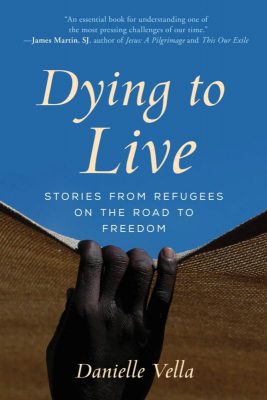WASHINGTON (CNS) — “People see refugees all the time as victims, but what they are is resilient,” said Danielle Vella, an official with Jesuit Refugee Service who spent six months collecting the stories of refugees, primarily in camps in Africa, Asia and Europe, but also the lucky few who have made it to the United States.
The first-person accounts Vella collected are published in her new book “Dying to Live: Stories From Refugees on the Road to Freedom.”
Vella appeared March 2 at Georgetown University in Washington as part of a tour of Jesuit colleges and universities in the United States to promote the book.

In an interview with Catholic News Service prior to a lunch-hour address, Vella said the idea for “Dying to Live” was first floated by its publisher, Rowman & Littlefield. Vella had visited refugee camps in 2016 as the number of refugees worldwide were swelling, and wrote weekly articles about her journey that were later published in book form.
“Some of them I’m still in touch with,” Vella said of the refugees she interviewed for the new book. “Some people I don’t know where they are.”
Vella said she was “better prepared than before” to hear the heart-wrenching tales of violence and deprivation that confronted refugees in their bid to find a new home. Some of the refugees endured unspeakable horrors before deciding to flee their native land. Others encountered even worse treatment while fleeing. The first dozen pages of “Dying to Live” include enough devastation for a 200-page book.
Hakeem, an Afghani, recounted when Taliban fighters took away many of his village’s young people: “Their families don’t know what happened to them to this day.” It is a tough call, he added. “We are afraid of the government and afraid of (the) Taliban too. Whatever we do, one side is going to see us as the enemy.”
Anwar, a Pakistani man, ran a school that educated both Muslims and Christians. The Pakistani Taliban wanted it shut down, had desks set afire, then murdered his dog — with threats his family would be next.
“Anwar was afraid now,” Vella writes. “The very next morning at dawn, he asked a close friend to call for him and his family. ‘We went far away to a city near Islamabad. In my place, they didn’t know where we had gone,’ he says. The family stayed indoors from then onward. Anwar did not even allow his children to go to school. Anwar fled to Europe, leaving behind enough for his wife and children ‘so that my children would be able to eat.'”
Martin spoke to Vella about being a forced child conscript of the Ugandan military. “We were not even given the chance to bathe; the only chance was when we crossed a small river, that is when the water touches you, or when it rains,” he said, noting he wore the same clothing for six months. “I’ve seen people dying when they got tired; they cannot walk anymore. I’ve seen people killed before my eyes, people slaughtered like goats. We were forced to watch how they were killed. That was the training they were giving us.”
Even with the trauma they experienced, these refugees still have hope, Vella said. “In fact, they shame you into hoping for them,” she added, noting they were surprisingly open about sharing their stories. They have left their home and work behind — and in some cases their family — but “they want to feel useful,” Vella said.
Despite the differences in country, religion and circumstances, the refugees she interviewed undertook their perilous journey and “trust that God will do the rest,” Vella said, to keep them safe and alive until they reach their ultimate destination.

Refugees also possess a great deal of trust, she added. While in flight, they put themselves in God’s hands. Once they are in a new country, they place themselves in the hands of asylum and immigration officials and policymakers.
Vella wonders whether the hope refugees have is misplaced. “Almost all refugees hope they are taken in by a prosperous country,” she told CNS, but at the luncheon she said that lack of coordination by the European Union is stymieing that possibility.
“Europe is 700 million” people, said Vella, a native of Malta who currently works for JRS in her home country. “One million (the estimated number of refugees in Europe awaiting placement) into 700 million should not be so hard,” she told the lunch audience.
“I’m afraid the majority of refugees will never leave the camps,” she told CNS. “They’re in a kind of limbo.”
She paused for a moment, then said, “I remember I was at Vatican Radio in 2004 when the Vatican said limbo doesn’t exist anymore. … But this is kind of like a limbo on earth.”






















